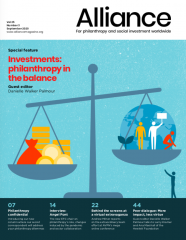Inside the world of philanthropic investments
The philanthropic world is facing mounting challenges from the impacts of climate change to inequality, global pandemics and authoritarian populism increase. At the heart of sector debates is the question of how foundations use their resources: not just the small amount for grantmaking and other charitable spending but the totality – most of which is invested in global capital markets in sectors such as aviation and pharma, through vehicles such as hedge funds and private equity and managed by discrete investment houses, many of whom are unknown to philanthropy practitioners let alone the wider public.
For a vocal group, the current moment demands foundations spend more of their resources now and use the management of their investments to signal their values – and their virtue – even if it means eroding their assets.
But for others, the calculus is rather different. One important case is the California based Hewlett Foundation. In their dialogue with Alliance guest editor, Danielle Walker Palmour, Hewlett’s president Larry Kramer and Chief investment officer, Ana Marshall set out some remarkable and controversial terms for using their $10 billion endowment rejecting the ‘easier course’ to give more now in favour of an approach which sets money aside for future generations. Whatever approach is taken, foundations will need to be more transparent now that investing in global capital markets is at the heart of both philanthropic debate and public concern. Hewlett and others can rightly expect interest in who manages their investments, and who benefits.
In itself, that is no bad thing. And if nothing else, we hope this issue of Alliance tells us more about what we don’t know – with whom do foundations entrust their assets.
This issue also marks the arrival of our new column – Philanthropy confidential – our space for you to tell Regi, our secret philanthropy correspondent, what’s on your mind. A lot it turns out.






















